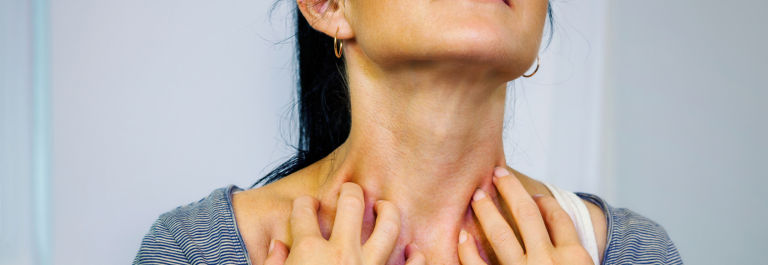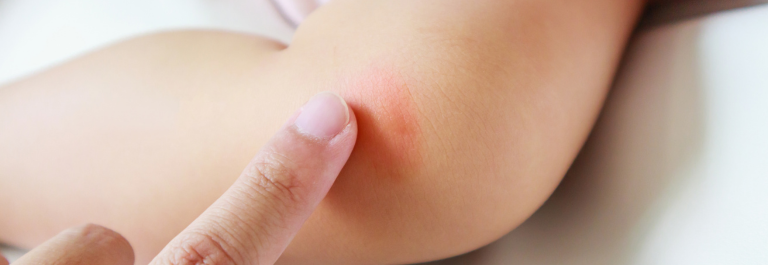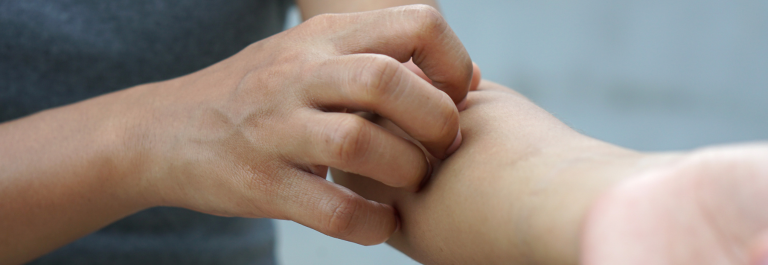Itchy skin affects most people at some point throughout your lifetime, whether you're going through an allergic reaction, coping with a skin infection, or your skin's simply been dried out by the colder or warmer weather.
The delicate skin of your neck can be particularly prone to developing an itchy rash, coming into contact with irritable clothing fabrics, jewelry, skin-care products, and sweat.
While, for the most part, an itchy rash is little more than a temporary annoyance, in severe cases, itching can disrupt your sleep or impact your mental health, requiring further medical treatments.
If this sounds familiar, don't fret! Throughout this post, we're going to explore everything you need to know about:
-
The most common symptoms of a neck rash
-
The possible causes for itchy skin on your neck
-
Effective, natural treatments for soothing an itchy rash
Keep reading to learn why you might have developed an itchy neck and how best to treat your aggravated skin today.
Neck Rash: Common Symptoms
There are many reasons you might develop an itchy neck, so, as you can imagine, symptoms of neck rashes will be very diverse and varied, too.
There are a few common symptoms to look out for that might be your body's way of telling you that something's not quite right. These include:
-
Skin rash - including dry skin, scaly patches, spots, bumps, skin blisters, or welts
-
Redness and skin discoloration
-
Skin feels hot or sore to the touch
-
Swelling
-
An itching, burning, or stinging sensation
Why Does My Skin Itch?
Most typically, skin itching (pruritus) is caused by the body's inflammatory response, which is then registered by your brain and spinal cord as an itching sensation.
While there's nothing more irresistible than scratching a constant itch, scratching at your skin can worsen the itching, damaging your delicate nerve endings and creating micro-ruptures in your skin barrier.
What Are The Causes of An Itchy Neck?
As we've discussed, neck rashes can be triggered by various causes, including environmental and medical factors.
Pin-pointing the cause behind your rash can play a crucial role in helping you identify the best possible treatments in the future, so we will outline some of the most common culprits to help you on your way.
Skin Conditions
Many common skin conditions are characterized by itchy skin:
-
Eczema- In the case of eczema (atopic dermatitis), itchy skin is caused by a weakened skin barrier, dry skin, and the disruption of the skin's delicate microbiome balance, which throws off your skin's optimum pH levels.
-
Psoriasis- This autoimmune disease is characterized by the build-up of itchy, scaly patches or 'plaques' of dead skin cells.
-
Hives - This common skin condition is typically triggered as part of an allergic reaction, causing itching due to the body's inflammatory response and the development of raised red welts or bumps.
-
Lichen Simplex Chronicus - This is a common form of chronic neurodermatitis that presents as dry, patchy areas of skin that are scaly and thick.
Allergic Reactions
Allergies are another major cause of itchy skin, particularly around your neck.
For example, your skin might be allergic to some of the rough or irritable fabrics in your clothing, the chemicals in your laundry detergent, your skin care or perfume, or specific metals in your jewelry, such as nickel.
Specific food allergies can also trigger a neck rash, such as an allergy to peanuts or shellfish.
In the case of an allergic reaction, itching is caused when your immune system releases histamine and other defensive chemicals into your bloodstream to help 'protect' against threatening triggers. These chemicals then drive your body's inflammatory response, which creates itching.
Skin Infections
A range of infections, including bacterial infections, fungal infections, parasitic infections, viral infections, or yeast infections, can also cause an itchy neck.
That's because the delicate creases and folds of your neck can be prone to trapping dirt or sweat, increasing your risk of developing a secondary skin infection. This is especially true if you have any cuts, open wounds, or broken skin on your neck, such as from chafing or shaving.
Itchy bacterial infections include impetigo, scarlet fever, and Rocky Mountain spotted fever. Some examples of common parasitic infections include scabies or head lice.
Other Conditions
In some rare cases, a neck rash might be more than just skin deep, indicating a more severe, underlying medical condition.
For example, liver disease is often associated with an itchy rash due to the build-up of bile salt underneath the skin. Specific nerve disorders can also cause itching, including shingles and multiple sclerosis.
When Is It Time To See A Doctor?
We'd urge you to seek medical attention if:
-
Your symptoms aren't responding to any home treatments
-
Your itchy rash is impacting your sleep or your mental health
-
Your neck rash begins to spread to your entire body
-
You believe your inflammation could be connected to a food allergy, or you're experiencing any symptoms of anaphylaxis (struggles to breathe, drop in blood pressure, light-headedness).
How To Treat Neck Rash
You can take many steps today to help soothe your irritated skin. These include:
Using a Calming Moisturiser
Our Organic Manuka Skin Soothing Cream is an excellent natural treatment to soothe itchy skin and manage eczema symptoms. An oil-based balm, it's made with six ingredients, including antibacterial and anti-inflammatory Manuka honey. It's the perfect choice for sensitive skin, eczema, or psoriasis because it does not burn or sting.
We recommend using it at least twice daily (morning and night), or anytime you wash your skin, as this will help restore any lost moisture.
Keep Your Neck Clean
To avoid the risk of developing a rash, keeping the skin around your neck area clean is essential. Particularly if you are going through an allergic reaction, washing regularly will help to wash allergens off your skin, such as chemicals from your perfume or pollen in the air.
Suppose you're looking for a natural soap that won't cause an adverse reaction or strip the skin of its protective oils. Check out our Coconut and Sunflower Oil Soap Bar. It offers a naturally light and clean smell, leaving the skin feeling soft and smooth.
Wear Soft, Hypoallergenic Clothing
Nothing is worse than having to wear stiff, itchy fabrics when trying to recover from a skin rash. Instead, try swapping out your clothing for a soft, stretchy, breathable alternative to avoid irritating your neck even more.
We'd recommend the Remedywear™ Long Sleeve Shirt for Adults or Kids. Made with TENCEL and anti-inflammatory zinc, our shirts offer antibacterial and anti-microbial properties, making them the perfect treatment for itchy skin conditions and rashes.
Soothe Your Neck Rash Today
Follow these tips to help you determine the cause of your itchy neck rash today, helping you decide on the best course of treatment and find relief from itching fast.










